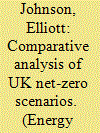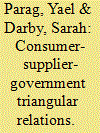| Srl | Item |
| 1 |
ID:
191309


|
|
|
|
|
| Summary/Abstract |
Final energy demand in the UK has remained relatively constant since the 1970s. However, most of the scenarios that model pathways to achieve the UK's net-zero greenhouse gas emissions by 2050 indicate that energy demand reduction (EDR) will be an important pillar of climate change mitigation. Despite this, the UK Government has no clearly defined strategy to reduce demand. This comparative analysis explores the role of EDR across twelve UK-based climate scenarios from four organisations that estimate changes in carbon emission and energy consumption from 2020 to 2050. We focus on changes in final demand across the economy, assessing the scale of ambition and the implications for the rest of the energy system in the context of net-zero. All the pathways explored achieve reductions of at least 32.8% in total final energy demand from 2020 to 2050, suggesting that this is the minimum level of demand reduction required to achieve the development and rollout of the supply side technologies necessary to decarbonise the energy system. Reductions in total final demand of up to 52% are demonstrated. We find that pathways with higher levels of EDR mitigate against technological challenges, such as scaling up renewable energy capacities, are less reliant on carbon-dioxide removal technologies and require less investment – but are characterised by higher levels of social change.
|
|
|
|
|
|
|
|
|
|
|
|
|
|
|
|
| 2 |
ID:
091567


|
|
|
|
|
| Publication |
2009.
|
| Summary/Abstract |
The UK residential (household) sector is responsible for approximately 30% of total carbon dioxide emissions and is often seen as the most promising in terms of early reductions. As most direct household emissions come from only two fuel sources, this paper critically examines how existing emissions reduction policies for the sector shape - and are shaped by - relations between the three main groups of actor in this policy domain: central government, gas and electricity suppliers, and energy users. Focusing on relations between three dyads (government-suppliers, suppliers-consumers and consumers-government) enables us to examine aspects of demand reduction that have often been overlooked to date. By 'relations' we refer to services, power relationships and flows of capital and information, as well as less easily defined elements such as loyalty, trust and accountability. The paper argues that the chosen government policy path to deliver demand reduction, which heavily emphasises the suppliers' role, suffers from principal-agent problems, fails to align consumers and supplier interests toward emissions reduction, and does not yet portray a lower-carbon future in positive terms. It suggests that more attention should be paid to government-consumer relations, recognising that energy consumers are also citizens.
|
|
|
|
|
|
|
|
|
|
|
|
|
|
|
|